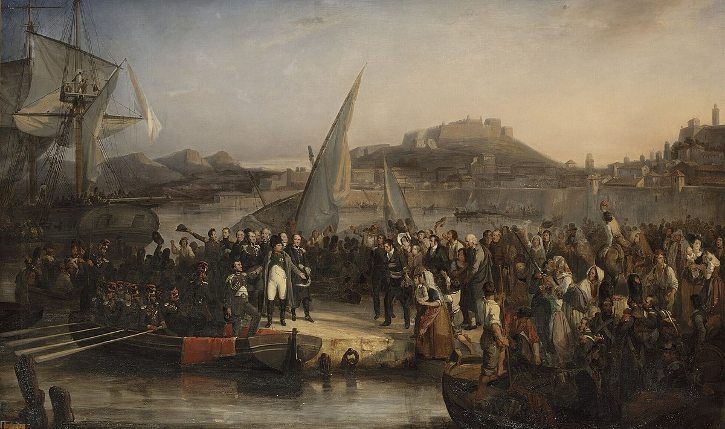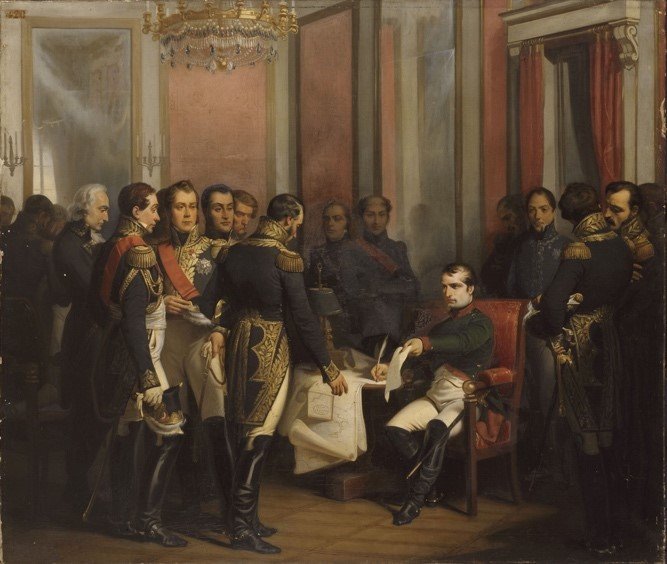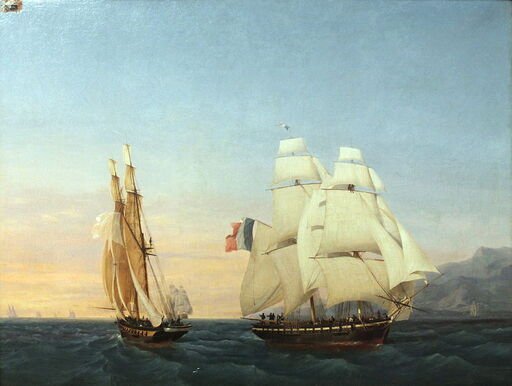Napoleon Escapes from Elba
By Natty Croucher, Third Year History
“Soldiers: in my exile I have heard your voice; I have come back in spite of all obstacles, and all dangers. Your general, called to the throne by the choice of the people, and raised on your shields, is restored to you; come and join him.”
Napoleon to French troops on his return from Elba, 5th March 1815.
On the evening of the 26th of February 1815, the Emperor Napoleon silently escaped from his exile on the island of Elba, where he had resided since his ultimate defeat in 1814 at the hands of the sixth coalition of European forces, who were once again determined to check the power of the French Empire. Napoleon had been exiled via the stipulations of the Treaty of Fontainebleau, signed by Allied powers on the 11th April 1814, which ruled that the Emperor, whilst retaining his title and rank, would hold ‘complete sovereignty and ownership’ of the island of Elba for the remainder of his life. Napoleon and his wife, Marie-Louise, were promised an annual income of two million francs, along with the right to form a garrison of up to four hundred of the French Imperial Guard, at the Emperor’s own expense. The immediate family of Napoleon were also offered an annual income, totalling 2.5 million francs. The treaty’s other articles broadly reflected the respect, and perhaps admiration, that allied powers held towards Napoleon after almost two decades of bitter war against him.
Treaty of Fontainebleu, 11th April 1814
Napoleon was acutely aware, throughout his stint on the island, that some European powers were contemplating plans to send him to a more remote island to ensure that he would have no future influence in France. The Times newspaper in Britain, in May 1814, for example, was clear in its view as to the Emperor’s exile, stating:
‘"Napoleon's exile in Elba is an insufficient remedy... he is only removed from the scene of action, and the mischief remains behind"
There were significant fears amongst the Allies that Napoleon would return if the opportunity arose. In attempts to suppress the chance of this the British sent the army officer Neil Campbell to lead the monitoring of the Emperor’s movements, and the great informer Talleyrand ensured that a spy in Napoleon’s camp would relay any significant incidents first to the French consul on Elba and then back to Paris. The Emperor remained in contact with France through a number of letters and visitors, and although the British were sceptical, they did not interpret these as anything particularly sinister. It seemed, virtually up until his escape, that Napoleon was under relative control.
He wasn’t.
When Campbell departed the island for mainland Italy in February, Napoleon saw his opportunity. Shaken by rumours that he may be taken into exile elsewhere, perhaps to the island of St Helena in the South Atlantic, and spurned on by rumours that resistance to the restoration of Louis XVIII was becoming more widespread, Napoleon ordered the repair and preparation of the ship Inconstant and invented a number of excuses that readied his grenadiers for departure. On Sunday the 26th, in the morning, he informed his companions of his plan, and at 9pm that evening, boarded his ship that would take him back to mainland France.
Retour de l'Île d'Elbe, showing Zéphir and Inconstant, by Jean-François Garneray
Between the 1st and the 20th of March, Napoleon marched with an ever-increasing number of soldiers and followers from San Golfe, near Cannes, all the way to Paris. The only real sign of resistance appeared at Grenoble on the 7th of March, where the route was barred by French infantry. His attempts at a stirring speech were met with silence, so he offered the soldiers an opportunity:
“Soldiers of the 5th, I am your Emperor, recognise me! If there is a soldier amongst you who wants to kill his emperor, I am here!”
“Soldats du 5e, je suis votre empereur. Reconnaissez-moi. S’il est parmi vous un soldat qui veuille tuer son empereur, me voilà!”
The 5th Regiment of the Line were convinced, and cheered together with Napoleon’s force ‘Vive L’Empereur’, accompanying his forces on their continued journey to Paris along the Route Napoleon. The infamous Marshal Ney (nicknamed the ‘bravest of the brave by Napoleon, and one of his closest former Marshalls), had been sent by Louis XVIII to apprehend Napoleon, but also joined the the Emperor at Auxerre on the 18th of March when the forces crossed paths.
Napoleon arrived in Paris on the 20th of March (conveniently chosen as it was the fourth birthday of his son, Napoleon II), marking the commencement of what was contemporarily labelled the ‘Hundred Days’, or the War of the Seventh Coalition.
Defeat at the hands of European powers was virtually inevitable. The poor state of the French army upon Napoleon’s return meant that, at first, the Emperor had only 46,000 soldiers at his disposal. Whilst he was eventually able to increase this number to close to 200,000, it would be no match for the allied forces that numbered between 750,000 and 1,000,000. Whilst making good account of himself at the Battle of Ligny and Quatre Bras, inflicting a decisive defeat on the Prussians in the former, the Battle of Waterloo on the 18th June 1815 proved to be an insurmountable task. Outnumbered in the end by a coalition force of 120,000 versus Napoleon’s roughly 70,000, the French eventually capitulated.
Battle of Waterloo, 18th June 1815
Napoleon returned to Paris in the early hours of the 21st and announced his second abdication on the 24th. Originally expecting to be given residence in the United States, Napoleon handed himself over to the British navy in July 1815. Failing acceptance to America, Napoleon assumed that he would be granted some form of asylum in England. On the 31st, though, in a sense of twisted fate, it was announced to him that he would be taken to the island of St Helena as a prisoner of war. Formal protest from the Emperor was ignored, and Napoleon was forced aboard HMS Northumberland to commence the nine-week journey to one of the most remote islands in the world.
This time there would be no escape. Emperor Napoleon would die on the island on the 5th of May 1821, aged 51. His legacy, though, lives on.




